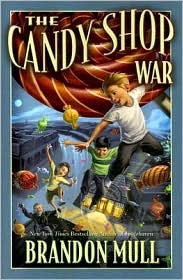Recently, I’ve become a big fan of Brandon Mull. This sort of surprised me because I’m really not that into fantasy. But, I read Beyonders around Christmas and loved it, and then I tried Fablehaven and liked it quite a bit. Most recently, I read The Candy Shop War, and I am quite excited to tell you not only why I enjoyed it, but why I have developed a lot of respect for Mull as an author.
This book takes the old adage "don't take candy from strangers" and turns it into a full-blown, high-risk adventure. A group of four friends start working to earn candy at the candy shop that has just opened. For each task they complete, they receive a treat. At first, they are washing windows for fudge, but eventually the tasked they are asked to complete become more sinister, like stealing artifacts and robbing graves. As the tasks become more risky, the treats become more intriguing: candy that makes you float, candy that changes your appearance, and even candy that allows you to travel through time.
Brandon Mull has a real talent for building suspense. I find it very impressive that I can sit down to read a middle grade novel with young characters and be completely engaged in the action and be anxious for the characters. This is the kind of book that had me continually yelling out “What?!” or “No!” because, ohmygoodness, something crazy was just always happening. And it was awesome.
As I've read more of Mull's books, I've come to really admire the way he crafts the language of his novels. Even though he is writing for younger kids, he doesn't shy away from using a slightly more advanced vocabulary. At the teacher book club meeting for Beyonders, a lot of teachers said that had bothered them. When they asked him about it, Mull explained that he works to find the best word to create the image he sees for his readers, but that he doesn’t really try for challenging vocabulary and doesn’t try to avoid it either. Brandon Mull writes pretty exclusively for young readers, and, obviously, he respects those readers and their right to read good books. A lot of young adult and middle grade authors write down to kids, and that’s really not conducive to writing something worth reading.
The Candy Shop War gets 4 stars. While it is meant for younger audiences, it is a fun read that will keep readers of all ages interested right to the end.
This book takes the old adage "don't take candy from strangers" and turns it into a full-blown, high-risk adventure. A group of four friends start working to earn candy at the candy shop that has just opened. For each task they complete, they receive a treat. At first, they are washing windows for fudge, but eventually the tasked they are asked to complete become more sinister, like stealing artifacts and robbing graves. As the tasks become more risky, the treats become more intriguing: candy that makes you float, candy that changes your appearance, and even candy that allows you to travel through time.
Brandon Mull has a real talent for building suspense. I find it very impressive that I can sit down to read a middle grade novel with young characters and be completely engaged in the action and be anxious for the characters. This is the kind of book that had me continually yelling out “What?!” or “No!” because, ohmygoodness, something crazy was just always happening. And it was awesome.
As I've read more of Mull's books, I've come to really admire the way he crafts the language of his novels. Even though he is writing for younger kids, he doesn't shy away from using a slightly more advanced vocabulary. At the teacher book club meeting for Beyonders, a lot of teachers said that had bothered them. When they asked him about it, Mull explained that he works to find the best word to create the image he sees for his readers, but that he doesn’t really try for challenging vocabulary and doesn’t try to avoid it either. Brandon Mull writes pretty exclusively for young readers, and, obviously, he respects those readers and their right to read good books. A lot of young adult and middle grade authors write down to kids, and that’s really not conducive to writing something worth reading.
The Candy Shop War gets 4 stars. While it is meant for younger audiences, it is a fun read that will keep readers of all ages interested right to the end.







